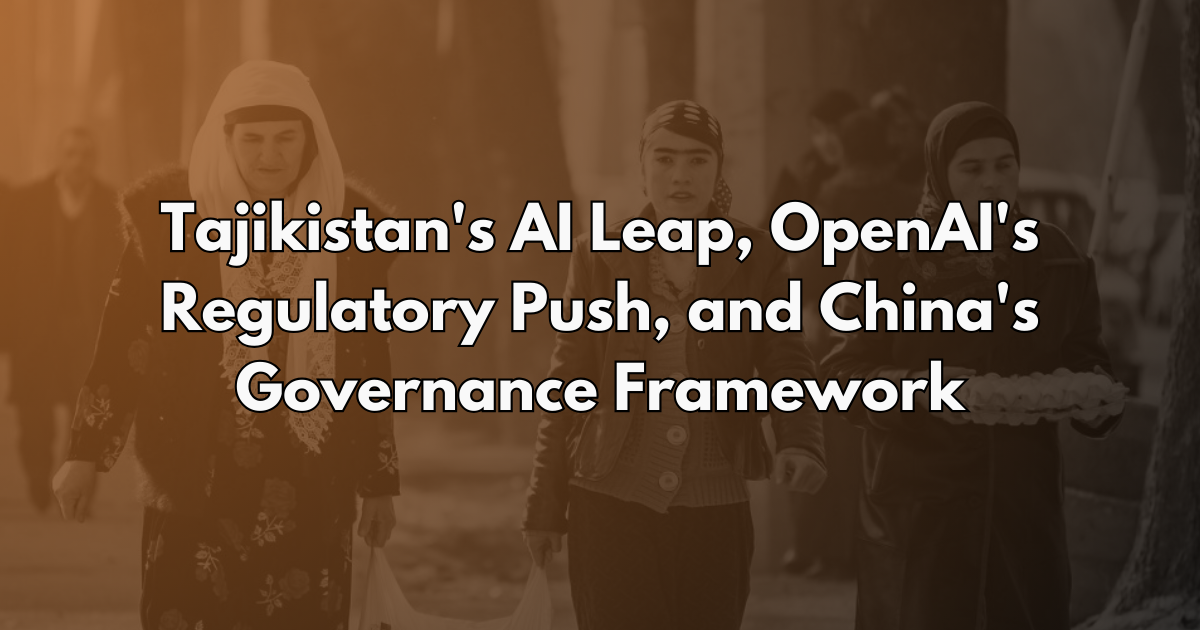
Tajikistan's AI Leap, OpenAI's Regulatory Push, and China's Governance Framework - AI Policy Brief #31
August 19, 2025 -
AI Policy Brief
Hi there,
Welcome to this week's edition of the AI Policy Brief, your go-to source for the latest developments in AI regulations, safety standards, government policies, and compliance requirements worldwide. This week, we're covering a range of topics from national and international policy changes to advancements in AI safety and defense. In the U.S., the American Fintech Council is backing a new AI innovation bill, while OpenAI is urging California to establish unified AI regulations. Meanwhile, Tajikistan has launched a new AI center and regulation commission to oversee the burgeoning technology.
On the international front, China has proposed a new framework for AI governance, and Jade Leung has been appointed as an AI advisor to the UK Prime Minister. In the realm of AI safety, Anthropic has introduced a conversation-ending feature to its Claude models, and FIU is developing protections against data poisoning. Stay informed with us as we delve into these stories and more, providing you with the insights you need to navigate the evolving landscape of AI policy.
Welcome to this week's edition of the AI Policy Brief, your go-to source for the latest developments in AI regulations, safety standards, government policies, and compliance requirements worldwide. This week, we're covering a range of topics from national and international policy changes to advancements in AI safety and defense. In the U.S., the American Fintech Council is backing a new AI innovation bill, while OpenAI is urging California to establish unified AI regulations. Meanwhile, Tajikistan has launched a new AI center and regulation commission to oversee the burgeoning technology.
On the international front, China has proposed a new framework for AI governance, and Jade Leung has been appointed as an AI advisor to the UK Prime Minister. In the realm of AI safety, Anthropic has introduced a conversation-ending feature to its Claude models, and FIU is developing protections against data poisoning. Stay informed with us as we delve into these stories and more, providing you with the insights you need to navigate the evolving landscape of AI policy.
National Policy
Tajikistan has established an Interdepartmental Commission on Artificial Intelligence Regulation and plans to open a Regional Center for Artificial Intelligence in Dushanbe, aiming to integrate AI into various sectors for sustainable development.
OpenAI has sent a letter to California Governor Gavin Newsom, advocating for AI regulations that align with federal and global standards, emphasizing the need for clear national guidelines.
OpenAI has sent a letter to California Governor Gavin Newsom, advocating for AI regulations that align with federal and global standards, emphasizing the need for clear national guidelines.
International Policy
China has proposed a new AI governance framework at the 2025 World Artificial Intelligence Conference, aiming to balance AI development with security. Meanwhile, PrivacyCheq launched aiCheq, a platform using Hedera's ledger to ensure compliance with global privacy regulations for AI training data.
Regulatory Actions
Texas Attorney General Ken Paxton is investigating Meta and Character.AI for allegedly misleading marketing of AI chatbots as mental health tools for children, while Sen. Josh Hawley has launched a separate investigation into Meta over AI chatbot interactions with minors. Meanwhile, Google introduced an AI-powered tool called Flight Deals to assist travelers in finding cheaper flights.
Defense & Security
The Lithuanian Ministry of National Defense is exploring partnerships with the U.S. defense industry to enhance military applications of AI. Meanwhile, the U.S. Air Force is seeking an AI-enabled platform to simulate high-intensity conflict scenarios, aiming to improve military training and preparedness.
Innovation & Investment
The African Development Bank has launched an AI training initiative in Lusaka, Zambia, in collaboration with the African Union Commission to enhance digital skills across Africa. Meanwhile, NVIDIA and the U.S. National Science Foundation have partnered with Ai2 to develop open AI models for scientific research in the U.S. through the OMAI project.
AI Safety
Anthropic has introduced a conversation-ending feature for its Claude models, enhancing safety by terminating harmful interactions. Meanwhile, SPQR Technologies launched Lex Aegis, a framework aimed at involving the public in the creation of laws for AI accountability and trust. These developments highlight ongoing efforts to improve AI governance and safety.
- EEE AI Governance Protocol Launched for Licensed Professionals
- FIU Develops AI Protection Against Data Poisoning
- Anthropic Adds Conversation-Ending Feature to Claude Models
- Grok AI Personas Prompts Revealed
- SPQR Technologies Unveils Lex Aegis for AI Governance
- IIT Delhi Issues Guidelines for AI in Education
- Study Shows Data Filtering Enhances AI Model Safety
- Meta AI Chatbots Allowed Romantic Chats with Minors
- Reynolds & Moore Launches AI Safety Standard
Court Cases, Hearings and Lawsuits
Tajikistan launches an AI center and regulation commission to oversee AI development. Dallas introduces an AI procurement system in collaboration with Hazel.
We hope you enjoyed this article.
Consider subscribing to one of our newsletters like AI Policy Brief or Daily AI Brief.
Also, consider following us on social media:
More from: Regulation
02/21
Mistral CEO Warns of AI Power Concentration at India Summit
02/21
OpenAI and Microsoft Join UK’s AI Alignment Coalition
02/16
OpenAgent Becomes SEC-Registered Transfer Agent for Tokenized Assets
02/16
US Military Reportedly Used Anthropic’s Claude in Venezuela Raid
02/13
ElevenLabs Secures AIUC-1 Certification and Launches Insured AI Voice Agents
More from: Data Protection & Privacy
10/01
Meta to Use AI Chat Data for Targeted Ads on Facebook and Instagram
08/28
Anthropic Introduces Data Sharing Option for AI Training
08/21
Grok Chats Become Publicly Searchable on Google
08/15
PrivacyCheq Introduces aiCheq for AI Privacy Compliance
08/13
O.NE People and Prighter Partner for AI-Driven Privacy Compliance
